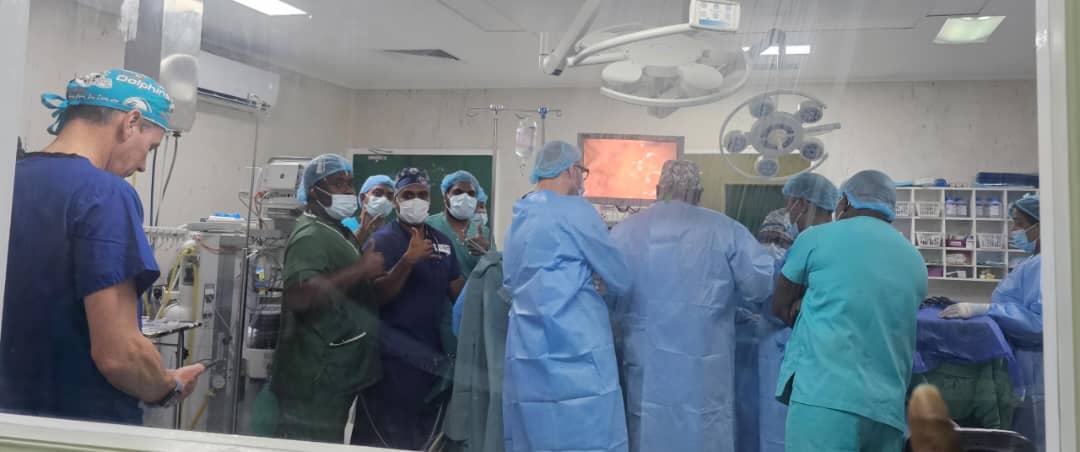Port Moresby, Papua New Guinea – 14 May 2025
Prime Minister Hon. James Marape has described the nation’s first successful kidney transplant as a “monumental achievement” in Papua New Guinea’s health care history, marking a bold new chapter in the country’s journey toward self-reliant, specialist medical services.
The historic surgery was carried out this afternoon at the Port Moresby General Hospital (PMGH), following the formal endorsement of the National Surgical, Obstetric and Anaesthetic Policy (NSO&A Policy) 2025–2030 by the National Executive Council. The transplant makes PNG the first Pacific Island nation to successfully perform an organ transplant.
“This is a historic moment not just for our medical community, but for every Papua New Guinean,” Prime Minister Marape said. “It is proof that our vision of providing complex, life-saving health care within our borders is becoming a reality. Our people should no longer have to struggle to raise enormous funds to seek treatment overseas.”
Two live-donor transplant surgeries were scheduled for today, with the first procedure beginning at 1:00 PM. The operations were performed under the supervision of the UK-based Transplant Links Community (TLC), which worked closely with PNG’s own medical professionals to ensure clinical and ethical best practices were followed.
A Vision Realised: From Policy to Practice
The success of the kidney transplant reflects the Government’s broader health transformation agenda, as set out in the National Health Plan 2021–2030 and the Medium-Term Development Plan IV. These frameworks prioritize access to specialist care and the development of local capacity across PNG’s health sector.
PMGH has been designated as PNG’s Level 6 National Tertiary Referral and Teaching Hospital, a move that strengthens its role as the country’s primary centre for advanced care, postgraduate training, and medical research. The Government’s support—alongside contributions from the National Fisheries Authority, state-owned enterprises, and international medical partners—has been key to making this milestone possible.
“This is a promise fulfilled,” said Prime Minister Marape, referring to his 2022 pledge that by 2025, Papua New Guineans would no longer need to travel overseas for specialist treatment. “We are now delivering on that commitment.”
Addressing a Growing Health Crisis
Chronic Kidney Disease (CKD) is a growing concern in PNG, driven by the rising prevalence of diabetes and hypertension. Over 40 patients currently undergo dialysis at the PNG Kidney Foundation in Port Moresby, with more diagnosed each week. The high cost of dialysis—ranging from K10,000 to K30,000 annually—often forces families to relocate and endure extreme financial hardship.
In the last five years, 21 Papua New Guineans have travelled abroad for kidney transplants, costing the country an estimated K10–13 million, with each procedure priced as high as K600,000.
“A kidney transplant is the most effective and cost-efficient solution to this crisis,” Marape stated. “It offers our citizens a chance at renewed life and relieves families of the immense burden that comes with long-term dialysis.”
Economic and Regional Implications
The Prime Minister also underscored the broader economic and strategic benefits of developing in-country transplant services, including cost savings, improved national productivity, and the potential emergence of PNG as a regional hub for organ transplants in the Pacific.
“This investment strengthens our health system and lays the groundwork for medical tourism, positioning Papua New Guinea as a centre for specialist services in the region,” he said. “Our collaboration with experts from the UK, Taiwan, Malaysia, and the Philippines reflects the growing international recognition of PNG’s health potential.”
Building a Comprehensive Health Future
The Kidney Transplant Centre is part of a broader portfolio of specialised health services now taking shape under the Marape Government. These include the Kumul Petroleum National Heart Centre and the upcoming National Cancer Centre, both of which are aimed at offering affordable, world-class care to Papua New Guineans.
“Today’s historic kidney transplant is not just a medical success—it is a reaffirmation of our government’s commitment to transform our health system into one that is equitable, accessible, and world-class,” said Prime Minister Marape. “Together, we are writing a new chapter in the health story of our nation—one that is built on hope, dignity, and the right of every citizen to quality health care at home.”

